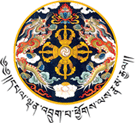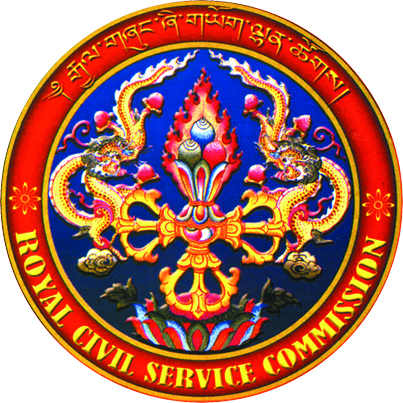Milestones
The Royal Command of His Majesty the King Jigme Khesar Namgyel Wangchuck granted to the Royal Civil Service Commission:
“Keeping in mind that in a small country like Bhutan, it is the bureaucracy’s example that will be followed, strengthening the civil service would be the first step to creating a strong foundation for a successful democracy. The civil service must strive for the highest standards, live by higher ideals and nurture a sense of duty towards fellow Bhutanese.
Therefore, the Royal Civil Service Commission should focus on bringing about required reforms of the civil service, in time for it to facilitate and support the emergence of democracy, meet the challenges of building dynamic economy and to fulfill its role in achieving the goals of Gross National Happiness.”
-12th of March 2007, Tashichho Dzong
CIVIL SERVICE MILESTONES
1973: The Department of Manpower was established under the Ministry of Development. As the Civil Service administration became more complex, due to rapid socio-economic development, the Royal Government recognized the need to further strengthen the Central Personnel Agency with a clear mandate.
1982: On 2nd June, 1982, His Majesty the King Jigme Singye Wangchuck issued a Royal Charter for the Royal Civil Service Commission. Accordingly, the Royal Civil Service Commission was established, as the Central Personnel Agency of the Government.
The primary focus was to ensure effectiveness and efficiency in the Civil Service, and loyalty and integrity among civil servants by ensuring uniformity of personnel actions throughout the Kingdom.
1989: Cadre System was introduced, which classified Civil Service occupations into eight cadres with a hierarchy of 17 grades.
The entry grade and also the highest grade to which the civil servants of each cadre could go were defined. The entry qualification required by each cadre for entering at different entry grades was known.
1990: In November 1990, the 1st edition of Bhutan Civil Service Rules and Regulations, BCSR 1990, was released. The objective was to translate the provisions of the Royal Charter for having an efficient human resource management and development system that was just, equitable and fair.
The BCSR 1990 served as an effective tool for strengthening personal administration system in the country.
1999: On 11th November, 1999, the Government undertook a major reform initiative to restructure the administrative system towards enhancing Good Governance. The theme of the reform was efficiency, transparency and accountability in the Bhutanese system of governance.
The Good Governance document 1999 had following recommendations for Royal Civil Service Commission:
- Expedite Job Classification System,
- Reinforce Merit-based career progression,
- Promote IT/ e-governance in HR management, and
- Organize regular training for civil servants on leadership and management.
2001: On 30th November, 2001, the process of drafting Constitution towards having parliamentary democratic system of governance was launched.
It was envisaged that with the perceived change in the governance, a stable and efficient public administration provided by the Civil Service of the country is extremely important for peaceful and orderly political succession and for the success of democratic governance.
2002: On 11th November, 2002, the 2nd edition of the Bhutan Civil Service Rules and Regulations, BCSR 2002, was released. The BCSR 2002 emphasized merit, excellence and professionalism in the Civil Service. Honesty, integrity, sincerity and selflessness were added to the core values of the Civil Service. Besides, emphasis was placed on efficiency in delivery of public services and high standard of morale among civil servants.
2003: In July, 2003, the 81st session of the National Assembly passed resolution that the Royal Civil Service Commission be reconstituted and strengthened to protect from politicization of the bureaucracy.It was resolved that the Chairman of the commission should be appointed by His Majesty the King.
2005: In December, 2005, a policy decision was taken to replace the prevailing Cadre System with Position Classification System (PCS) for having a merit based Civil Service enhancing Good Governance and excellence in the Civil Service.
The policy decision was taken to bring about a high standard of performance in the Public Administration System. The policy document provided the necessary direction to the Royal Civil Service Commission for having a new Civil Service order.
2006: In January, 2006, the Cadre System was replaced by PCS. The PCS classified Civil Service into 19 Major Occupational groups and 94 Sub-groups. The primary focus was to have a merit based, independent and apolitical Civil Service to serve the people with a high standard of efficiency, transparency, professionalism and accountability.
In June 2006, the 3rd edition of the BCSR 2006 was released based on PCS principles.
2007: In January 2007, pursuing the policy of decentralizing the HR actions, the recruitment in the operational position category was decentralized to the agencies.
The first Organizational Development (OD) exercise at national level was undertaken with an objective to define the right size of the Civil Service, organizational structure, staffing, strength and pattern, and the need for capacity building.
2008: On 18th July 2008, the Constitution of the Kingdom of Bhutan was adopted. The Constitution enshrines the Royal Civil Service Commission as a Constitutional body, apolitical and independent responsible to discharge public duties in an effective, transparent and accountable manner.
The Constitution made the Royal Civil Service Commission responsible to ensure that civil servants remain apolitical and render professional service, guided by the highest standards of ethics and integrity to promote good governance and social justice, in implementing the policies and programs of the Government.


 MaX manual 2023-Edition III
MaX manual 2023-Edition III